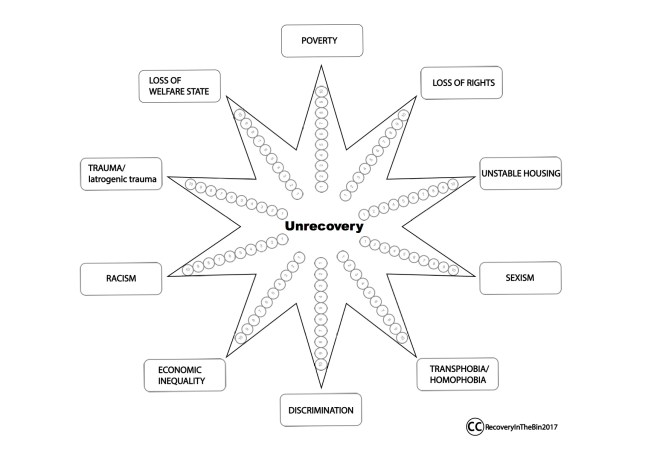

The ‘UnRecovery Star’ was developed directly from open discussions in the Survivor led Facebook Group ‘Recovery In The Bin’. We talked of wanting an alternative to the ‘Recovery Star’, which seemed a redundant, unhelpful, and blunt tool for narrowly judging how someone should be expected to ‘recover’.
In contrast, the ‘UnRecovery Star’ can be described as a ‘Social Justice tool’, which highlights the reasons why we go Mad, but also what can hinder our ‘recovery’ and maintain our distress. We really mean it when we say some of us will never feel ‘recovered’ due to the social and economic conditions we experience because they frame everything. Therefore, the ‘UnRecovery Star’ is political as well as personal, both intrinsically linked for many of us.
The strength of the ‘UnRecovery Star’ is being used as a teaching tool, in order to highlight social inequalities that exist and are still prominent in society, and helping students make those links to the causes of mental distress. The ‘UnRecovery Star’ clarifies that people’s problems are not merely individual problems rooted in something wrong with an individual person such as a faulty brain, genetic abnormality, or faulty personality. The ‘UnRecovery Star’ clarifies that humans are social beings and that the determinants of distress are to be found in families, communities, wider society, and social policies. The value of the ‘UnRecovery Star’ is that it demonstrates that we need to not just pay attention to distressed people, but deal with the problems that exist in communities and wider society, that mental health is a profoundly political issue.
As Survivors and allies we can also use the ‘UnRecovery Star’ as a means of campaigning for greater social equality, and protest against pharmagenetic psychiatry and psychocompulsion which dominates mental health treatment and welfare in the UK. We need social and political solutions for social problems, which the ‘UnRecovery Star’ simply and clearly identifies. Encouraging students and practitioners to consider these issues through CPD and activism with people with 1st hand experience. Examples of this work are seen in Psychologists Against Austerity, WalktheTalk, (the forthcoming Manchester conference ‘Psychologists and the benefits system), Mental Health Resistance Network, films such as psychocompulsion https://vimeo.com/157125824 the work of Lynne Friedli and Robert Stearn http://mh.bmj.com/content/41/1/40.full and RITB https://recoveryinthebin.org/2016/04/23/yippee/
Furthermore, Survivors can take their MH professionals to task by demanding what are they going to do as an intervention in the ‘therapeutic relationship’ about the issues that the ‘UnRecovery Star’ raises. In other words, Survivors can use this ‘Social Justice tool’ as a means of advocacy to try and address any unmet needs ie housing/welfare (both in and out of work) advocacy/professional reports.
Some may feel the language of ‘UnRecovery’ is a backwards and regressive step, but we believe the word ‘recovery’ has been co-opted and colonised from its more radical roots. We consider that the language of ‘recovery’ is no longer a helpful word to describe the outcomes that MH services now expect of us.
February 2016
NB. The Unrecovery Star can be provided in various formats and as a vector graphic for unlimited enlargement, please email us with requests recoveryinthebin@gmail.com the Unrecovery Star is covered by a Creative Commons Attribution-NonCommercial-NoDerivatives 4.0 International (CC BY-NC-ND 4.0) License 